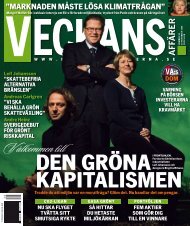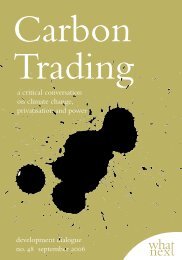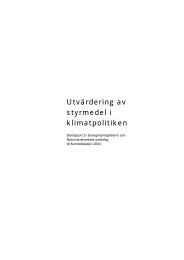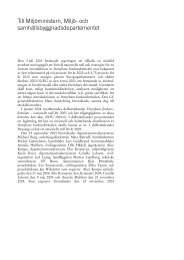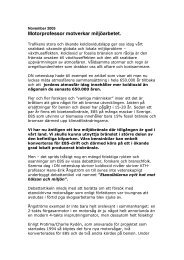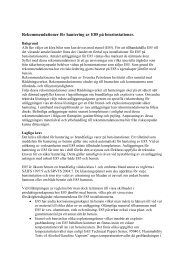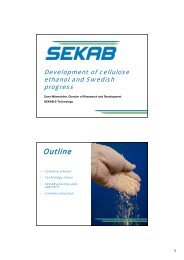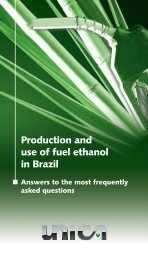Chapter 5 Table 10. <strong>Sugarcane</strong> and vegetation area in São Paulo State. Year <strong>Sugarcane</strong> Vegetation % SP State New lands (Kha) Land in use (Kha) Total area (Kha) Production (K<strong>to</strong>n) Productivity (<strong>to</strong>n/ha) Woody-Cerradao (Kha) Shrubby-Cerrado/ savana (Kha) 1983 345 1,421 1,765 107,987 76.0 196 489 1,139 7% 5% 1984 317 1,526 1,842 116,666 76.5 167 427 1,453 7% 6% 1985 326 1,626 1,952 121,335 74.6 221 438 1,545 8% 6% 1986 350 1,704 2,054 122,986 72.2 205 378 1,795 8% 7% 1987 311 1,753 2,064 132,322 75.5 211 348 1,870 8% 8% 1988 325 1,771 2,097 134,108 75.7 192 316 1,624 8% 7% 1989 322 1,757 2,078 130,795 74.5 198 325 1,487 8% 6% 1990 276 1,836 2,112 139,400 75.9 175 290 1,097 9% 4% 1991 301 1,864 2,165 144,581 77.6 198 301 1,601 9% 6% 1992 372 1,940 2,311 150,878 77.8 204 284 2,109 9% 8% 1993 371 1,989 2,360 156,623 78.7 238 259 2,120 10% 9% 1994 421 2,180 2,601 168,362 77.2 201 238 2,453 10% 10% 1995 449 2,260 2,709 175,073 77.5 189 220 2,434 11% 10% 1996 428 2,388 2,816 187,040 78.3 217 232 2,462 11% 10% 1997 422 2,451 2,872 194,801 79.5 215 244 2,478 12% 10% 1998 342 2,544 2,887 199,764 78.5 217 241 2,482 12% 10% 1999 281 2,475 2,756 193,374 78.1 218 244 2,468 11% 10% 2000 338 2,491 2,829 189,391 76.0 221 257 2,629 11% 11% 2001 440 2,569 3,009 201,683 78.5 223 262 2,622 12% 11% 2002 457 2,661 3,118 212,707 79.9 224 263 2,725 13% 11% 2003 495 2,818 3,313 227,981 80.9 225 264 2,720 13% 11% 2004 463 2,951 3,414 241,659 81.9 211 262 2,732 14% 11% 2005 553 3,121 3,673 254,810 81,7 217 254 2,648 15% 11% 2006 822 3,437 4,258 284,917 82,9 228 271 2,695 17% 11% 2007 935 3,897 4,832 327,684 84,1 233 277 2,716 19% 11% Source: IEA/CATI-SAAESP (Annual statistics from 1983-2007). 130 <strong>Sugarcane</strong> <strong>ethanol</strong> Native forests (Kha) <strong>Sugarcane</strong> area Native forests area
3.6. Air quality Environmental sustainability of sugarcane <strong>ethanol</strong> in Brazil Burning sugarcane for harvesting is one of the most criticized issue of sugarcane production system, causing local air pollution and a�ecting air quality, despite of the bene�ts of using 100% <strong>ethanol</strong> running engines instead of gasoline (Figure 9), which decreases air pollution from 14 <strong>to</strong> 49%. In order <strong>to</strong> eliminate gradually sugarcane burning, several attempts are being made. �e São Paulo Green Pro<strong>to</strong>col is being considered the most important one, setting an example for other regions and states in Brazil. Signed between the São Paulo state government (State Environment Secretariat) and the <strong>Sugarcane</strong> Growers Association (UNICA) in June 04, 2007, the Green Pro<strong>to</strong>col aimed at: • �e anticipation of the legal deadline for the elimination of the practice of sugarcane straw burning <strong>to</strong> 2014. • �e protection of river side woods and recovering of those near water streams (permanent protected areas - APPs). • �e implementation of technical plans for conservation of soil and water resources. • �e adoption of measures <strong>to</strong> reduce air pollution. • �e use of machines instead of �re <strong>to</strong> harvest new sugarcane �elds. Voluntarily 141 of the <strong>to</strong>tal of 170 sugar mills from the state of São Paulo signed this Pro<strong>to</strong>col, and recently 13 thousand sugarcane independent suppliers, members of the Organization of <strong>Sugarcane</strong> Farmers of the Center-South Region (Orplana), signed also this pro<strong>to</strong>col. �erefore the entire production chain of sugar and <strong>ethanol</strong> of São Paulo participates 100 85 CO 51 HC NO x Gasoline 0% E 22% Ethanol 100% Figure 9. Air pollution by different blends of <strong>ethanol</strong>. Source: ANFAVEA (2006). 100 80 <strong>Sugarcane</strong> <strong>ethanol</strong> 131 53 100 104 86
- Page 1 and 2:
Sugarcane ethanol Contributions to
- Page 3 and 4:
Table of contents Foreword 11 José
- Page 5:
Chapter 8 �e global impacts of US
- Page 8 and 9:
Foreword �e use of biofuels as a
- Page 11 and 12:
Executive summary Do biofuels help
- Page 13 and 14:
Executive summary 12. Projections o
- Page 15 and 16:
Chapter 1 Introduction to sugarcane
- Page 17 and 18:
Introduction to sugarcane ethanol A
- Page 19 and 20:
Introduction to sugarcane ethanol C
- Page 21 and 22:
Introduction to sugarcane ethanol F
- Page 23:
Introduction to sugarcane ethanol H
- Page 26 and 27:
Chapter 2 Production (million tons)
- Page 28 and 29:
Chapter 2 Table 2. Sugarcane produc
- Page 30 and 31:
Chapter 2 Harvested area (million h
- Page 32 and 33:
Chapter 2 million hectares 8 7 6 5
- Page 34 and 35:
Chapter 2 Table 5. Global significa
- Page 36 and 37:
Chapter 2 (FAOSTAT, 2008). �e lan
- Page 38 and 39:
Chapter 2 indicating that sugarcane
- Page 40 and 41:
Chapter 2 and vinasse produced duri
- Page 42 and 43:
Chapter 2 • • • • Harvested
- Page 44 and 45:
Chapter 2 2.2. AEZ assessment of la
- Page 46 and 47:
Chapter 2 The quantified descriptio
- Page 48 and 49:
Chapter 2 Table 8 summarizes by reg
- Page 50 and 51:
Chapter 2 Table 9. Suitability of u
- Page 52 and 53:
Chapter 2 Table 10. Suitability of
- Page 54 and 55:
Chapter 2 of bio-diversity and land
- Page 56 and 57:
Chapter 2 FAO, 1987. 1948-1985 Worl
- Page 58 and 59:
Chapter 2 Smeets, E., M. Junginger,
- Page 60 and 61:
Chapter 3 Considering that this deb
- Page 62 and 63:
Chapter 3 1,000 ha 9,000 8,000 7,00
- Page 64 and 65:
Chapter 3 Another source of data on
- Page 66 and 67:
Chapter 3 Figure 3. Different land
- Page 68 and 69:
Chapter 3 1-Pastureand crops expans
- Page 70 and 71:
Chapter 3 Given that the model is u
- Page 72 and 73:
Chapter 3 to the case studies; (d)
- Page 74 and 75:
Chapter 3 Mato Grosso do Sul in 200
- Page 76 and 77: Chapter 3 the Pasture class increas
- Page 78 and 79: Chapter 3 Table 5. Number of sugarc
- Page 80 and 81: Chapter 3 of 12.6% from 2001 to 200
- Page 82 and 83: Chapter 3 Table 6. South-Centre: ex
- Page 84 and 85: Chapter 3 4.5. Options for approach
- Page 86 and 87: Chapter 3 states that have lost pas
- Page 88 and 89: Chapter 3 It is important to contex
- Page 91 and 92: Chapter 4 Mitigation of GHG emissio
- Page 93 and 94: Table 1. Basic data: sugarcane prod
- Page 95 and 96: Mitigation of GHG emissions using s
- Page 97 and 98: GHG emission (kg CO 2 eq/m 3 etOH)
- Page 99 and 100: Mitigation of GHG emissions using s
- Page 101 and 102: Table 7. Soil carbon content for di
- Page 103 and 104: Mitigation of GHG emissions using s
- Page 105 and 106: 5. Conclusions Mitigation of GHG em
- Page 107: Mitigation of GHG emissions using s
- Page 110 and 111: Chapter 5 Oil reserves - Gasoline/d
- Page 112 and 113: Chapter 5 in research and developme
- Page 114 and 115: Chapter 5 Table 3. Summary of main
- Page 116 and 117: Chapter 5 3. Environmental indicato
- Page 118 and 119: Chapter 5 Table 4. Carbon stock in
- Page 120 and 121: Chapter 5 3.2. Water Total carbon i
- Page 122 and 123: Chapter 5 3.3. Soil and fertilizers
- Page 124 and 125: Chapter 5 3.4. Management of diseas
- Page 128 and 129: Chapter 5 in the implementation of
- Page 130 and 131: Chapter 5 Table 11. Continued. Crit
- Page 132 and 133: Chapter 5 Brazilian Government. Lei
- Page 134 and 135: Chapter 5 São Paulo State Governme
- Page 136 and 137: Chapter 6 2. Development of the eth
- Page 138 and 139: Chapter 6 blends by car manufacture
- Page 140 and 141: Chapter 6 Brazil have been roughly
- Page 142 and 143: Chapter 6 Overall there are few di
- Page 144 and 145: Chapter 6 3.2.1. The impact of exis
- Page 146 and 147: Chapter 6 �e use of ethanol in he
- Page 148 and 149: Chapter 6 cropping systems that pro
- Page 150 and 151: Chapter 6 certainty, the supply of
- Page 152 and 153: Chapter 6 De Vries, B.J.M., D.P. va
- Page 155 and 156: Chapter 7 Biofuel conversion techno
- Page 157 and 158: Biofuel conversion technologies �
- Page 159 and 160: Biofuel conversion technologies In
- Page 161 and 162: Biofuel conversion technologies the
- Page 163 and 164: Biofuel conversion technologies Imp
- Page 165 and 166: Biofuel conversion technologies Pro
- Page 167 and 168: Investment costs (Euro/kWth input c
- Page 169 and 170: 4.2. Greenhouse gas balances Biofue
- Page 171 and 172: Reduction in CO equivalent emission
- Page 173 and 174: Biofuel conversion technologies �
- Page 175 and 176: Biofuel conversion technologies pot
- Page 177 and 178:
Chapter 8 The global impacts of US
- Page 179 and 180:
The global impacts of US and EU bio
- Page 181 and 182:
The global impacts of US and EU bio
- Page 183 and 184:
The global impacts of US and EU bio
- Page 185 and 186:
The global impacts of US and EU bio
- Page 187 and 188:
Table 1. Change in output due to EU
- Page 189 and 190:
The global impacts of US and EU bio
- Page 191 and 192:
Forest cover Pasture cover USEU 201
- Page 193:
The global impacts of US and EU bio
- Page 196 and 197:
Chapter 9 also risks and serious tr
- Page 198 and 199:
Chapter 9 Box 2. Bioethanol stoves
- Page 200 and 201:
Chapter 9 �e highest impact on po
- Page 202 and 203:
Chapter 9 the increased generation
- Page 204 and 205:
Chapter 9 o�ers to support the MD
- Page 206 and 207:
Chapter 9 Price variation (%) 14 12
- Page 208 and 209:
Chapter 9 Dufey et al., 2007a). Leg
- Page 210 and 211:
Chapter 9 manufactured directly fro
- Page 212 and 213:
Chapter 9 in mechanical aid for the
- Page 214 and 215:
Chapter 9 Table 1. Import tariffs o
- Page 216 and 217:
Chapter 9 3.8. Improving efficiency
- Page 218 and 219:
Chapter 9 some minimum transport in
- Page 220 and 221:
Chapter 9 IEA, 2004. Biofuels for T
- Page 223 and 224:
Chapter 10 Why are current food pri
- Page 225 and 226:
Why are current food prices so high
- Page 227 and 228:
2.4 Long-term drivers of supply Why
- Page 229 and 230:
3.1. Effects on the supply side Why
- Page 231 and 232:
3.3 Policy responses to rising food
- Page 233 and 234:
3.4. Other effects • Why are curr
- Page 235 and 236:
- - - - Why are current food prices
- Page 237 and 238:
18 16 14 12 10 8 6 4 2 0 5. The fut
- Page 239 and 240:
• • • Why are current food pr
- Page 241 and 242:
6.1. Policy implications Why are cu
- Page 243:
Why are current food prices so high
- Page 247 and 248:
Authors Dr. Marcos Adami, senior re
- Page 249 and 250:
Keyword index A Africa 204, 205, 20
- Page 251:
M maize 20, 83, 104, 173, 184, 187,



